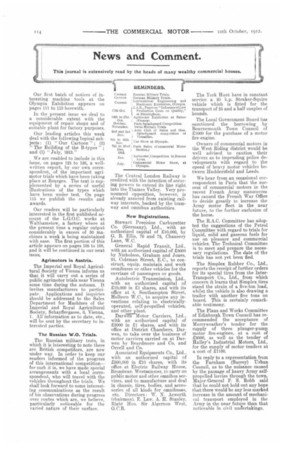News and Comment.
Page 12

If you've noticed an error in this article please click here to report it so we can fix it.
This journal is extensively read by the heads of many wealthy commercial houses.
Our first batch of notices of interesting machine tools at the Olympia Exhibition appears on pages 111 to 113 herewith.
In the present issue we deal to a considerable extent with the equipment of repair shops and of suitable plant for factory purposes.
Our leading articles this week deal with the following 'topical subjects: (1) " Our Cartoon " ; (2) "The Building of the B-types ' ; and (3) "July, 1913."
We are enabled to include in this issue, on pages 123 to 126, a wellwritten report, by our own correspondent, of the important agrimotor trials which have been taking place at Bourges. The text is supplemented by a series of useful illustrations of the types which have been under test. On page 115 we publish the results and awards.
Our readers will be particularly interested in the first published account of the L.G.O.C. works at Walthamstow1 a factory where at the present time a regular output considerably in excess of 30 machines a week is being maintained with ease. The first portion of this article appears on pages 105 to 108, and it will be continued in our next issue.
Agrimotors in Austria.
The Imperial and Royal Agricultural Society of Vienna informs us that it will carry out a series of public agrimotor trials near Vienna some time during the autumn. It invites manufacturers to participate. Applications and inquiries should be addressed to the Sales Department for Machines of the Imperial and Royal Agricultural Society, Schayflergasse, 6, Vienna, 1. All information as to date, etc., will be sent by the secretary to interested parties.
The Russian W.O. Trials.
The Russian military tests, in which it is interesting to note there are British competitors, are now under way. In order to keep our readers informed of the progress of this international competition— for such it is, we have made special arrangements with a local correspondent, who will travel with the vehicles throughout the trials. We shall look forward to some interesting communications as the result of his observations during progress over routes which are, we believe, particularly noticeable for the varied nature of their surface.
The Central London Railway is credited with the intention of securing powers to extend its line right into the Thames Valley. Very pronounced opposition, however, is already assured from existing railway interests, backed by the tramway and omnibus authorities.
New Registrations.
Stewart Precision Carburetter Co. (Germany), Ltd., with an authorized capital of 210,000, by G. B. Ellis, 70 and 72, Chancery Lane, W. C.
General Rapid Transit, Ltd., with an authorized capital of £5000 by Nicholson, Graham and Jones, 24, Coleman Street, EC., to construct, equip, maintain and work omnibuses or other vehicles for the carriage of passengers or goods.
Autoleetric Transmission, Ltd., with an authorized capital of £10,000 in 21 shares, and with its office at 8, Southampton Street, Holborn W.C., to acquire any inventions relating to electricallyoperated, self-propelled vehicles, and other plant.
Darwen Motor Carriers, Ltd., with an authorized capital of £2000 in El shares, and with its office at District Chambers, Darwen, to take over the business of motor carriers carried on at Darwen by Beardmore and Co. and Orrell and Co.
Associated Equipments Co., Ltd.. with an authorized capital of 2500,000 in £10 shares, with its office at Electric Railway House, Broadway. Westminster, to carry on public motor and other omnibus services, and to manufacture and deal in chassis, tires, bodies, and a,ccesseries of all kinds for omnibuses, etc. Directors : W. N. Acworth (chairman), E. Law. A. H. Stanley, Right Hon. Sir Algernon West. G.C.B. The York Hunt have in constant service a 20 h.p. Straker-Squire vehicle which is fitted for the transport of 25 and a half couples of hounds.
The Local Government Board has sanctioned the borrowing by Bournemouth Town Council of 21000 for the purchase of a motor fire-engine.
Owners of commercial motors in the West Riding district would be well advised to caution their drivers as to impending police developments with regard to the speed of heavy motor vehicles between Huddersfield and Leeds.
We hear from an occasional correspondent in Paris that the success of commercial motors in the recent French Army manceuvree has caused the French War Office to decide greatly to increase the Army motor fleet in the near future, to the further exclusion of the horse.
The R.A.C. Committee has adopted the suggestions of the Petrol Committee with regard to trials for liquid, solid and gaseous fuels for use on pleasure and commercial vehieles. The Technical Committee is to meet and prepare the necessary regulations. The date of the trials has not yet been fled.
The Simplex Rubber Co., Ltd., reports the receipt of further orders for its special tires from the InterTransport Co., Ltd., from which concern it learns that Simplex tires stand the strain of a five-ton load, whilst the vehicle is also drawing a trailer with another five tons on board. This is certainly remarkable testimony.
The Plans and Works Committee of Edinburgh Town Council has recommended the acceptance of Merryweather's tender for the supply of three plunger-pump motor fire-engines, at a cost of E3000, as well as the tender of H.alley's Industrial Motors, Ltd., for the supply of motor tenders at a cost of 21100.
In reply to a representation from the Farnham (Surrey) Urban Council, as to the nuisance caused by the passage of heavy Army selfpropelled lorries through the town, Major-General F. S. Robb said that he could not hold out any hope that there would be any less marked increase in the amount of mechanical transport employed in the Army in the near future than that noticeable in civil untTertakings.


























